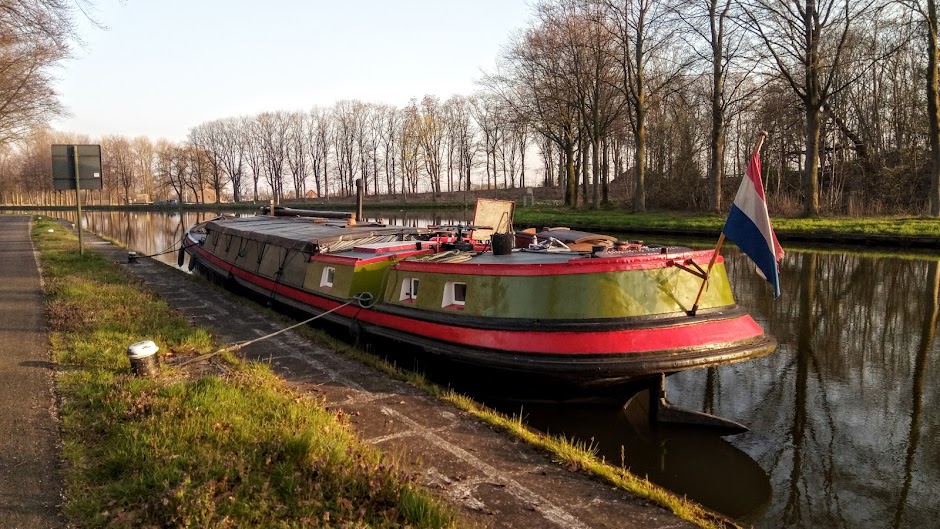Perhaps I should also mention that the Oude Haven where I have my barge is the centre of social life in Rotterdam as well as a museum harbour, so it has a couple of tourist hotels very close by. What happens as a result is that coaches head straight for the harbour to offload their human and other baggage before parking up in the street along the quayside for the night.
This means that we often have the pleasure of putting on a performance for the very large groups of visitors who gather right in front of the boats, many of whom are fascinated by these old vessels and even more intrigued by the motley collection of humanity (their idea, not ours) that seems to congregate on board.
 |
| Doing what we normally do: deck washing |
These performances are not official - or even arranged. They just happen as we go about our normal business of deck washing, painting and regular maintenance. Okay, sometimes Koos has put on a show of being 'the man at work'. He has been known to trek to and from the yard with miscellaneous planks of wood, some of which have needed attention, but more often because he likes the attention himself. For the most part, though, we just do what we normally do, which seems to generate intense interest from those above us (or below, depending on the tide).
Well, to get back to the story, I was sort of aware of all this when I moved to the Oude Haven in 2001, but I didn't realise the real implications at the time. The problem only became one when I bought my barge, the Vereeniging, and moved on board. Actually, it wasn't even then. It was when after moving on to the barge, there were a few changes to the boats' arrangements, and I ended up at the end of the row of 'museum exhibits' that lined the quay.
This was when I suddenly became Exhibit A, not only for reasons of historic charm (the barge's, not mine), but because I was also in an ideal spot from which to take photos of another of Rotterdam's most famous art exhibits - the Cubist Houses.
 |
| The Cubist Houses in the background |
So this is how it came to happen that one morning I opened my trap - sorry hatch - to find a whole group of Japanese photographers making their way down my gangplank and taking up photography poses on my foredeck with their latest and greatest Canons and Nikons.
Granted, I have a very large foredeck. It can hold at least twenty tightly squeezed photographers of small stature including their tripods and photographic gear. But what I wasn't prepared for was their complete lack of awareness that there was anyone living on board, or indeed, anyone inside the boat at all.
 |
| The gangplank: Maximum three persons! And my capacious foredeck |
Now as you probably all know, our friends from the east are extremely courteous and become easily embarrassed by any suggestion that they have inconvenienced you. So the image of twenty of these lovely people with both shutters and mouths open in suspended animation as I emerged from my depths with Sindy in tow was a sight I wish I'd been able to capture myself.
Sindy of course barked, and the moment was broken; the shutters and mouths clacked closed and my twenty visitors, not knowing whether to bow in apology or collect up their gear and scram, scurried back up the gangplank with much vocal, if incomprehensible, dismay. Given that said gangplank is only supposed to carry a maximum of three people at a time, the consequent bending and straining of the steel as at least ten of them crowded onto it had me in suspended animation, or rather inhalation, instead.
Luckily nothing gave way and they all made it safely to shore, but I realised then I would have to make some kind of 'keep out' system.
In fairness to the tourists, our barges are supposed to maintain the exterior image and profile of working cargo boats, so I cannot really blame them for thinking there is no one home, but it is a trifle disconcerting to be the object of such interest, and even more to be regarded as a handy platform for other pursuits. We've had them all: drunken students, courting couples and avid historians are the most frequent. But since old boats are supposed to represent good luck, we often have bridal parties taking up poses along the gangplank for the regulation wedding photos. This can be somewhat tricky if you are on your way to work and can't get off the boat because the bride in all her finery is draped across your exit.
So there it is: another aspect of harbour life that hasn't made it into my books. Still, having now published both Watery Ways and Harbour Ways about the Oude Haven, maybe I should save these blog posts for a collection of Watery Blogways!











